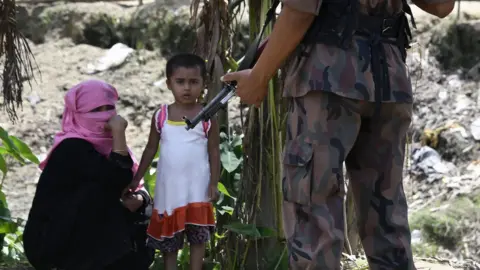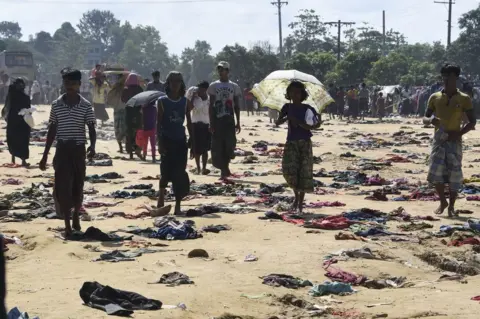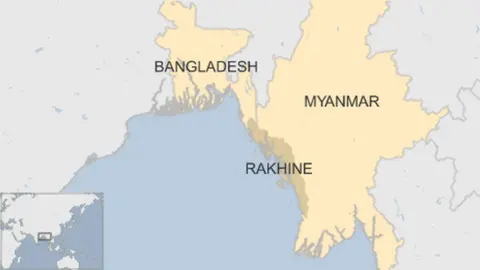Rohingya crisis: Bangladesh to restrict movement of migrants (original) (raw)

 AFP
AFP
Bangladeshi security forces are already guarding Rohingya camps near the border
Bangladesh is limiting the movement of more than 400,000 Rohingya migrants who have fled from neighbouring Myanmar.
They must stay in fixed places allocated to them by the government and not travel elsewhere, police say.
Bangladesh also announced plans to build shelters for up to 400,000 people near the city of Cox's Bazar.
The mainly Muslim Rohingyas have been fleeing a Myanmar government offensive since last month, which the UN says could amount to ethnic cleansing.
Rights groups have accused the military of burning Rohingya villages.
But the army says it is responding to attacks by militants and denies it is targeting civilians.
Meanwhile, a fresh diplomatic row between Bangladesh and Myanmar has broken out over alleged violations of Bangladeshi airspace in the past week.
- Tales of horror from Myanmar
- Seeing through the official story in Myanmar
- Why won't Aung San Suu Kyi act?
What are the new restrictions?
In a statement, Bangladeshi police said Rohingyas would not be allowed to travel anywhere outside of their allocated homes, not even to live with family or friends.
Transport operators and drivers have also been urged not to carry refugees, with landlords told not to rent out any property to them.
Analysts say the government wants to stop the Rohingya from disappearing into the general population and to keep them visible, in the hope of returning them to Myanmar - or even a third country.
What do we know about the new shelters?
According to Bangladesh's Daily Star newspaper, the new shelters will be on a site covering about 8 sq km (3 sq miles) of land, close to established camps which have been overwhelmed by arrivals from Myanmar.
A total of 8,500 temporary toilets will be built and 14 "makeshift warehouses" will be set up near the shelters, the paper says.
The new shelters are meant to be built within 10 days.

 AFP
AFP
Many Rohingya migrants live in improvised camps


The violence has been concentrated in Myanmar's Rakhine area


An ambitious plan, but is it plausible?
Jonathan Head, BBC Southeast Asia correspondent
Bangladesh faces a colossal task accommodating the now more than 400,000 Rohingyas who have fled Myanmar. It rightly demands a lot more international support. And that support has been slow in coming.
One reason is the dramatic surge in the numbers of new arrivals in a very short period of time. Another is the politics of aid in southern Bangladesh.
The UN refugee agency is not allowed to deal with the large numbers of Rohingya who are living outside of official refugee camps as they do not want these people to have refugee status. Instead that role has been given to the International Organisation for Migration, a UN-related agency with expertise in assisting and monitoring migrants. The UN, with its proven "cluster system", is normally tasked with coordinating large-scale humanitarian emergencies.
In this context, the plan to build 14,000 homes, and 8,000 latrines is ambitious. The ten-day timescale set by the government seems unrealistic. In reality, many tens of thousands of Rohingyas are surviving with no shelter and little food, with more arriving every day. No-one has yet drawn up a plausible plan for assisting them all.
The BBC's Jonathan Head went on a government-organised trip to Rakhine state last week


How is the crisis affecting Myanmar-Bangladesh relations?
Tensions have been mounting, with Bangladesh's Prime Minister Sheikh Hasina heading to the UN General Assembly on Saturday to ask for more pressure to be put on Myanmar to help deal with the crisis.
The UN Security Council has appealed to Myanmar to stop the violence but no sanctions have been imposed.
The BBC speaks to Rohingya who say they were injured in landmine blasts
Bangladesh has also lodged a formal protest with Myanmar about its use of military drones and helicopters which, it alleges, have violated Bangladeshi airspace on three days in the past week.
Bangladesh described their use as "provocative". Myanmar denies the allegation.
The two countries have also locked horns over the issue of landmines, with Myanmar denying Bangladesh accusations that its army is planting them on the border to prevent refugees from returning.
How did we get here?
The violence began on 25 August when Rohingya militants attacked police posts in northern Rakhine, killing 12 security personnel.
Rohingyas who have fled Myanmar since then say the military responded with a brutal campaign, burning villages and attacking civilians in a bid to drive them out.
The Rohingya, a stateless mostly Muslim minority in Buddhist-majority Rakhine, have long experienced persecution in Myanmar, which says they are illegal immigrants.
Watch: Who are the Rohingya?
Some who fled from Rakhine state told the BBC earlier this month about killings, rape and even massacres, while inside Rakhine, a BBC crew witnessed charred homes inside Rakhine.
A new Human Rights Watch report released on Friday accused the Myanmar military of an "ethnic cleansing campaign" and detailed scores of villages targeted with arson attacks.
The BBC's Fergal Keane spoke to Buddhists in Myanmar's second city, Mandalay
Myanmar officials blame the Rohingya insurgents for the violence, with government spokesman Zaw Htay urging displaced people to find refuge in temporary camps set up in Rakhine state.
However, Mr Htay said Myanmar would not be able to allow all those who fled to Bangladesh to return.